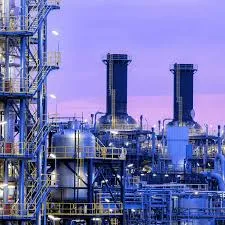
नवम्बर . 13, 2024 00:31 Back to list
thermal oil boiler system
Understanding Thermal Oil Boiler Systems
Thermal oil boiler systems play a crucial role in various industrial applications, particularly where temperatures exceed those achievable by water-based systems. These systems utilize thermal oil, a synthetic fluid engineered to withstand high temperatures without vaporizing, thus providing an efficient means of heat transfer in complex industrial processes.
How Thermal Oil Boilers Work
At the core of a thermal oil boiler system is the boiler itself, which heats the thermal oil to a specific temperature, typically between 300°C and 400°C. Unlike traditional water boilers, thermal oil boilers operate under low pressure, significantly reducing the risk of hazards associated with high-pressure steam operations.
The heating process begins when the thermal oil enters the boiler, where it is circulated through heating elements fueled by a variety of energy sources, including natural gas, propane, or electricity. Upon heating, the thermal oil exits the boiler and flows through a network of pipes to various heat exchangers, where it transfers its heat to the processes or equipment it is intended to serve.
One of the defining characteristics of thermal oil systems is their ability to maintain heat over long distances and through multiple stages of heat exchange. This ability is particularly beneficial in industries such as chemicals, textiles, food processing, and plastics where consistent heat application is critical.
Advantages of Thermal Oil Boiler Systems
1. High Efficiency Thermal oil systems can achieve significantly higher temperatures than water-based systems without the associated increase in pressure, which enhances thermal efficiency and reduces energy consumption.
2. Versatility These systems can accommodate a variety of heating applications, including direct and indirect heating processes. The thermal oil can be customized to meet specific temperature requirements depending on the application.
3. Enhanced Safety Operating at low pressure minimizes the risks associated with high-pressure steam systems, reducing the potential for accidents or explosions. Additionally, the thermal oil’s high boiling point prevents the loss of heat to the environment.
thermal oil boiler system

4. Long Lifespan The thermal oil used in these systems is designed to resist oxidation and thermal degradation, giving it a long operational life. With proper maintenance, thermal oil systems can outperform traditional boilers in terms of longevity.
5. Less Water Use Unlike water boilers, thermal oil systems do not require extensive water supplies or deal with the complications of water treatment, making them more environmentally friendly and cost-effective in regions with water scarcity.
Applications of Thermal Oil Boilers
Thermal oil boiler systems are employed in a variety of sectors due to their adaptability. In the chemical industry, for instance, they are used for heating reactors and distillation columns. In the food industry, they provide heat for processes such as drying, pasteurization, and cooking. Additionally, in the plastic manufacturing sector, thermal oil is used for the accurate heating of molds and forming equipment.
Moreover, in renewable energy applications, thermal oil is gaining traction in the area of concentrated solar power (CSP) plants, where it serves as a heat transfer fluid, storing thermal energy harnessed from the sun for later use in electricity generation.
Maintenance and Considerations
While thermal oil boiler systems are generally low-maintenance compared to traditional steam boilers, regular inspections and monitoring are essential to ensure operational efficiency and safety. Operators should check for leaks, monitor thermal oil levels, and ensure that the quality of the thermal oil remains optimal to prevent degradation.
Furthermore, it's crucial to establish and follow a proper oil replacement schedule based on the manufacturer's recommendations. This practice not only ensures the efficiency of heat transfer but also prolongs the life of the system.
Conclusion
Thermal oil boiler systems represent a significant advancement in industrial heating technology. Through their high efficiency, versatility, and safety features, they are increasingly becoming the go-to solution for industries requiring consistent and high-temperature heating solutions. As industries continue to evolve, the importance of such systems will undoubtedly grow, shaping the future of thermal energy processes. As engineers and manufacturers focus on optimization and sustainability, thermal oil systems will remain at the forefront of industrial heat transfer technology.
-
High-Efficiency Commercial Oil Fired Steam Boiler for Industry
NewsJul.30,2025
-
High-Efficiency Biomass Fired Thermal Oil Boiler Solutions
NewsJul.30,2025
-
High Efficiency Gas Fired Thermal Oil Boiler for Industrial Heating
NewsJul.29,2025
-
High-Efficiency Gas Fired Hot Water Boiler for Sale – Reliable & Affordable
NewsJul.29,2025
-
High Efficiency Biomass Fired Hot Water Boiler for Industrial and Commercial Use
NewsJul.29,2025
-
High-Efficiency Biomass Fired Hot Water Boiler for Industrial Use
NewsJul.28,2025
Related PRODUCTS






















